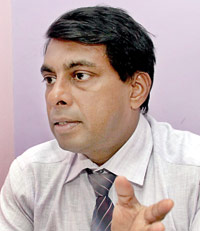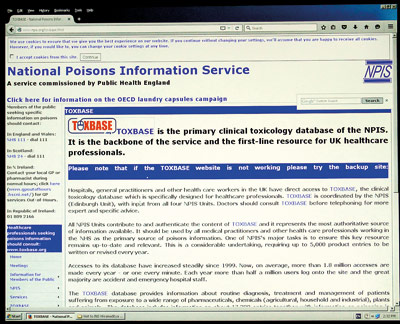News
Poison info centre website launched

Dr. Waruna Gunathilake: Head Toxicology & National Poisons Information Centre
The moment a patient is brought in with any kind of poisoning, doctors in all State hospitals need not flick through books to check out the best management for that particular case, for this information is now available at the click of the internet.
This tox-base (www.toxbaselanka.info) by the National Poisons Information Centre located within the National Hospital of Sri Lanka (NHSL) in Colombo while providing in-depth information to doctors of State hospitals also has information that can be accessed on January 1, this website will be a hub for toxicology and poison information.
“We are in cyberspace now,” says Dr. Waruna Gunathilake, Head of the Toxicology & National Poisons Information Centre, explaining that the tox-base has two domains, one for the public which can be accessed without a password and the other for medical professionals of State hospitals.
The information is in Sinhala and English and will also be in Tamil soon, he says, pointing out that he has had invaluable support from Dr. Palitha Mahipala, Director-General of Health Services and NHSL Director Dr. Anil Jasinghe as well as the World Health Organisation to launch this website.
General information on poisons and prevention of poisoning including articles and alerts on worldwide trends are available for the public which will be useful on a daily basis.
As the information for medical professionals in State hospitals includes “sensitive” poison-related clinical information useful in the management of critically-ill patients, this domain is restricted to password users who will have to be monitored by the hospital authorities.
With the Director General of Health Services authorising the registration of all State health institutions under the tox-base, these hospitals will be issued a pass code which should be kept secure by appointing a focal-point or the health education unit of each institution, he said.
The launch of this educative website which will also help clinicians is a major achievement for the National Poisons Information Centre which is the oldest national centre in south east Asia. Although India has as many as 28 centres, engaging in local work, there is no overall national centre.
The website will be updated regularly. “It’s an ongoing process,” says Dr. Gunathilake, pointing out that the tox-base on the web in the United Kingdom has to be subscribed to, after paying a fee, whereas this is free.
The National Poisons Information Centre tox-base has multi-channel access for medical professionals. Citing the example of a patient with poisoning being brought to a hospital along with the suspected poison remnants in a kuppiya, Dr. Gunathilake says that the doctors can tap the information from the website through any one of three channels – by typing in the trade name, the chemical name or even the chemical class (group).
Immediately, a description would be available along with crucial clinical features and how to manage the patient.
Pointing out that the tox-base on the web can also be used as a tool for e-learnng including online courses and distance learning, Dr. Gunathilake says that toxicology alerts will also be given promptly.
Looking ahead, he says that the National Poisons Information Centre is expecting to develop apps for dose calculations in the near future, dispelling the need for doctors to pore over books.
A highlight of the celebrations of the National Poisons Prevention Week in the latter part of the year will be the promotion of this website which consists of easily-accessible information on poisoning which could take different forms such as chemicals, agrochemicals and fertiliser, animals, plants and food.

